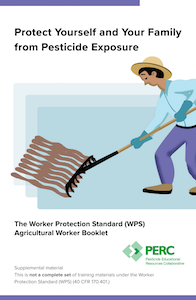Protect Yourself and Your Family from Pesticide Exposure: The Worker Protection Standard (WPS) Agricultural Worker Booklet

This worker booklet (in both English and Spanish) is intended for agricultural workers who work in agricultural establishments where pesticides were used in the last month (or so). Pesticide handlers and certified applicators are not included in this document’s audience.
Print quality versions of the booklet PDF are also available, in both English and Spanish.
This booklet is intended as a short reference for agricultural workers. It contains important information about protecting oneself and one’s family. It is not a complete set of training materials under the Worker Protection Standard (40 CFR 170.401).
Some trainers and learners will benefit from having this booklet as a companion piece when participating in annual WPS training for agricultural workers. With important health-related information, a piece of reference material may make all the difference for someone evaluating symptoms or planning family activities. Trainers may distribute after training is completed, or the day before training in order to invite more engagement.
The booklet contains:
- Emergency telephone number for poison control center(s)
- First aid procedures for pesticide exposures to the eyes or skin
- Steps to prevent workers from taking pesticide residue home with them
- Terms explained such as “REI” and “early entry worker”
- How to use the information at the central posting site to avoid treated areas
- More!
Remember, the WPS requires trainers to use a piece of EPA-approved training material to perform annual training as required. This booklet is not a complete set of training content, nor has it been reviewed for this purpose under 40 CFR 170.401(c)1. It is intended as a companion/supplement only.
Printed copies in English are available from NSPEC here. Printed copies in Spanish are available from the PERC store here.
Please contact us at PERCsupport@ucdavis.edu with any questions.

Regulatory Guidance
Browse brief guides about protections for workers and handlers, the AEZ, posting, PPE, exemptions, training, respirators, and more, in English and Spanish.